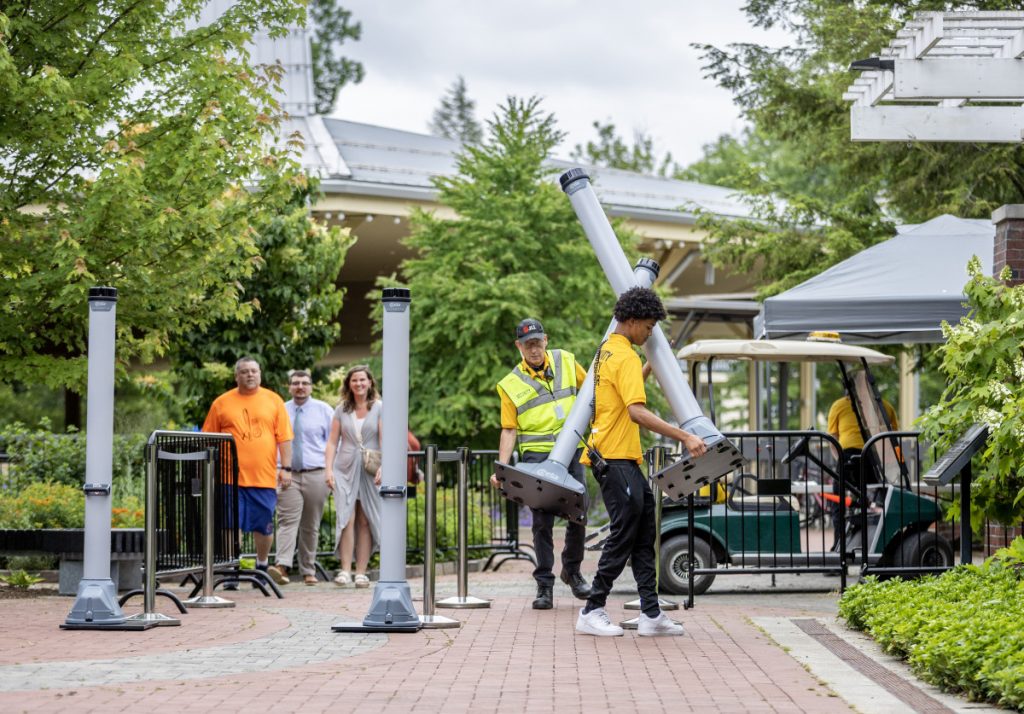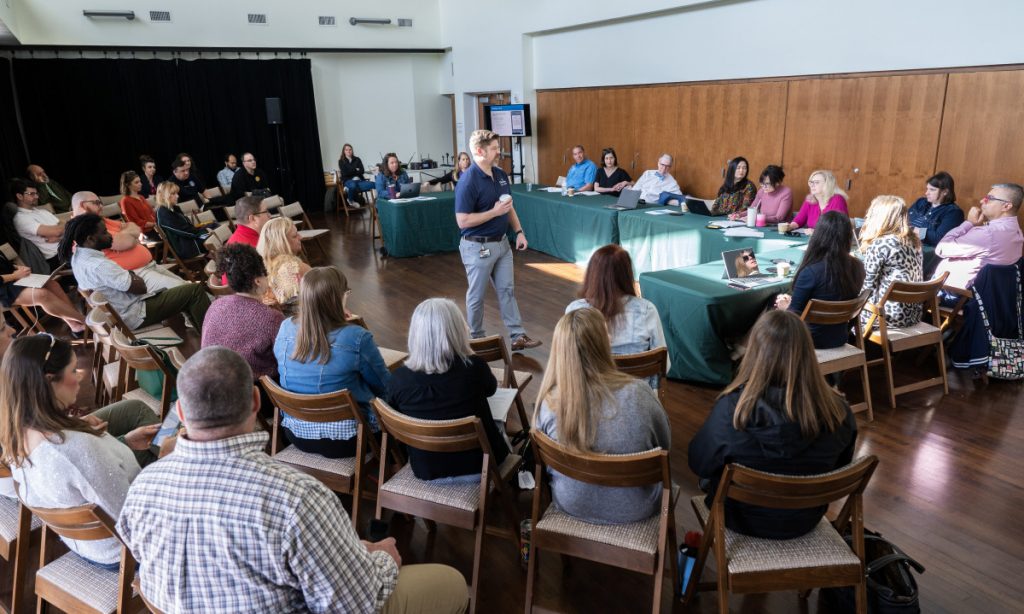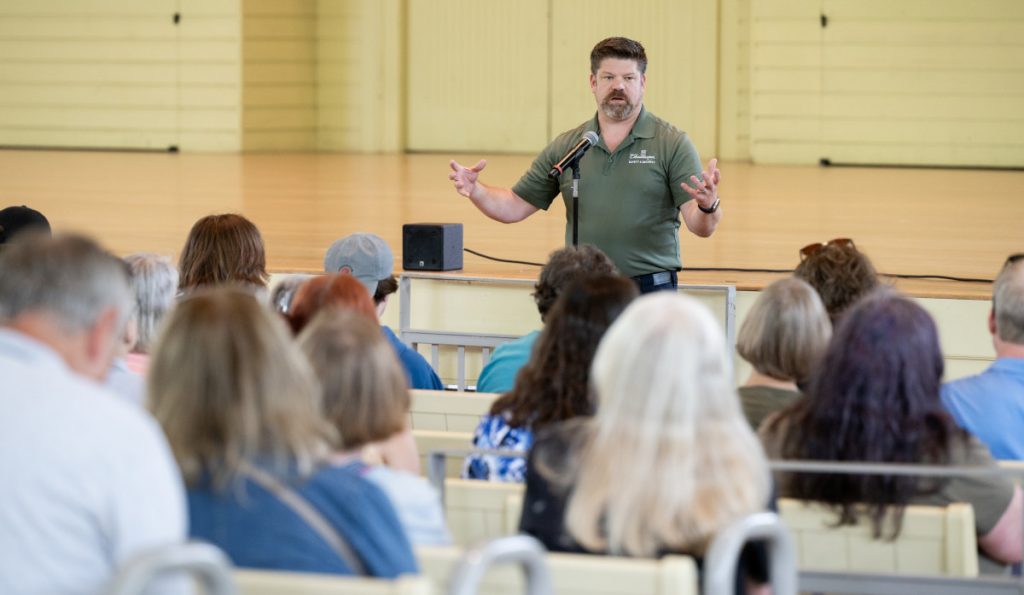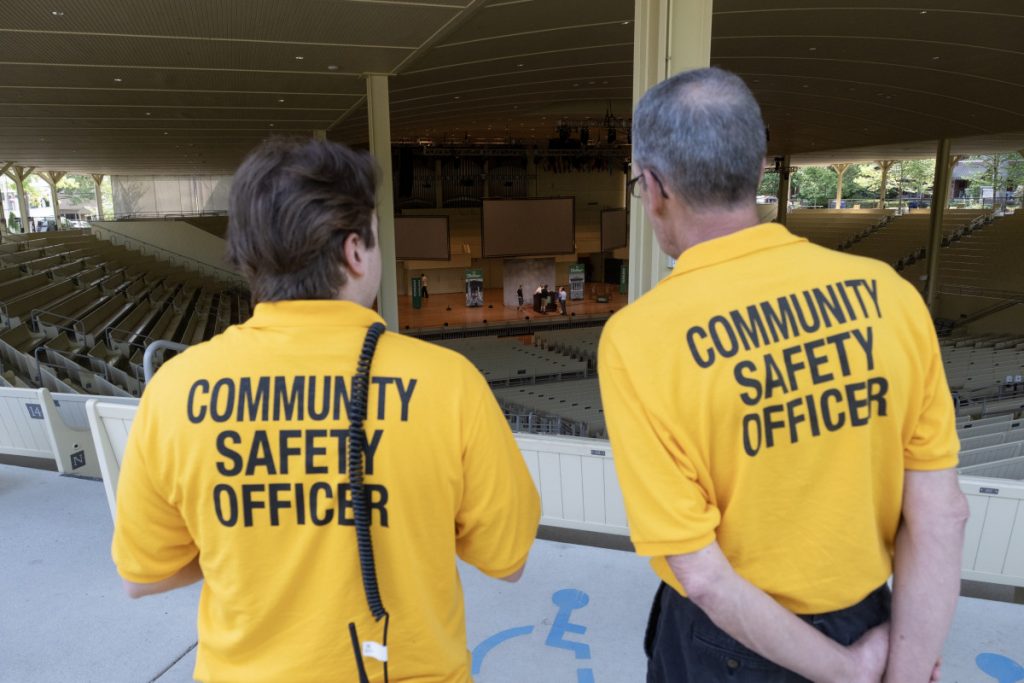
Arden Ryan
contributing writer
Much has changed at Chautauqua Institution since the opening of the Summer Assembly Season in 2022. While work had already begun in interviewing candidates for the new position of Director of Safety & Security and building out broader strategic safety policies and plans, the Aug. 12, 2022, attack on author and free speech advocate Salman Rushdie brought immediate changes to security measures in the waning days of the season.
The attack that took place on the Amphitheater stage shook a community to its core, and as that community and Chautauqua employees processed the events and trauma of Aug. 12, part of that processing meant a great deal of work for Wade Haubert and his colleagues. The quickly-implemented measures at the end of 2022 have developed into a robust new security platform, under Haubert’s leadership.
Haubert joined Chautauqua’s year-round staff last fall, and has been busy ever since. With a wealth of experience in law enforcement, military service, and emergency management, Haubert has helped craft policy, conducted high-level trainings, reviewed safety plans, worked closely with local law enforcement, and has conducted emergency response exercises with Institution administration and industry professionals.
Haubert said all of those trainings and policies have been undertaken with a careful approach, trying to strike a perfect balance between security and Chautauqua’s culture of openness, trust and dialogue. The hope, he said, is implementing best practices to keep the community safe, while honoring and maintaining the essence of the Chautauqua experience.


Chautauquans can look for a “refinement and enhancement of the procedures they saw being implemented late last season,” Haubert said, with new initiatives that respond to modern safety needs, but also protect the culture of the Institution.
Last summer, the only bags allowed inside the Amp after Aug. 12 had to be 4.5 inches by 6.5 inches or smaller — the size of a typical clutch purse. That regulation has evolved; now, any bag larger than that must be clear to be allowed inside the venue as part of the Institution’s clear container policy at all performance venues, including the Amp (and mesh bags do not count as see-through). Haubert said this policy will enable swifter visual screening and quicker, more efficient movement of audience members — avoiding bottlenecks at Amp gates, for example.
Haubert pointed out that Institution policy already prohibited firearms on the grounds, and weapons are prohibited in all venues. Here is where he said the balance between safety and culture comes into play — as an example, knitting needles are not considered weapons, and are allowed in the venues. So are umbrellas, empty seat cushions, and clear water bottles. Haubert is hopeful that the Chautauqua community will regulate itself in adhering to venue rules without Amp ushers needing to intercede.
Haubert’s also introduced a new emergency notification system, Everbridge. This software will enable both community members and staff to stay aware of emergencies on grounds, should they arise — Chautauquans are encouraged to sign up for the alerts by texting CHQ2023 to 333111, which will be used only for emergency purposes, and people can opt out at any time.
Employees will receive immediate messages with Everbridge if a crisis occurs, enabling staff to quickly act and assist as needed. Events in the Amp and in other venues will also begin with safety announcements, a move Haubert implemented to increase communication.
In Haubert’s new-formed role on the organizational side of campus safety, his responsibility is to “review and develop all policies and protocols for emergency preparedness,” he said. Designing training programs, creating safety plans, and establishing standard procedures are all part of his half of the responsibility, once held by a single safety director.

Billy Leone, Chief of Campus Safety & Security, takes on the operational half, and is charged with the “day-to-day operations of the campus safety staff,” he said, hiring, supervising, and implementing procedures.
Haubert’s role of strategic planning and Leone’s role of administration are “naturally different jobs, requiring different skill sets,” said Shannon Rozner, Chautauqua’s Senior Vice President of Community Relations.
“Such important work was beyond what one person could reasonably handle,” she said, making the transition to two positions a logical one. This change was being planned well before the end of last season, to meet the Institution’s expanding security needs and navigate changes Leone’s and Haubert’s department have undergone in recent years.
Haubert’s goal is to “instill process, training, and standards across the board” at Chautauqua, he said, with an “all-hazards approach to planning” for any possible incident, be it severe weather or a public safety emergency.
“The principles of emergency preparedness are the same no matter what the details of the situation,” Haubert said.
His job is to “institute industry best practices” for campus security, preparing the staff with the tools to face any and all emergencies. With proper training, Haubert said, comes the confidence to address any circumstance.
His department has a risk assessment model for vetting all events to determine their individual risk profile, which vary by performer, therefore requiring varying levels of security. For particular events in the Amp, his staff will set up an expanded secure perimeter around Odland Plaza, which may be equipped with weapons detection systems, handheld metal detectors, and other safety measures. But, he stressed, this will not be for all events.
The goals of this temporary perimeter are crowd management and for security officers to make a good-faith effort to provide extra security as needed — specifically, by “removing the line of sight from outside the gates to the performer,” Haubert said, and while it is a visible change, the crowd control system is a new best practice observing typical security protocols at many metropolitan venues.
Although specific performers or speakers may have special requests for the security staff, “we base our security plans on our risk assessment model,” Haubert said. His staff will not decrease those plans at the behest of individuals.
“When you come to the Institution, it’s our responsibility to uphold our safety plans” and provide a safe place for patrons to enjoy Chautauqua’s wealth of experiences.
The security presence on the grounds will be more visible — the Department of Safety & Security has approximately doubled the size of its staff, Leone said. Visitors can expect to see more safety officers in mustard-yellow shirts patrolling the grounds. Campus security has also added four additional armed officers for the summer, who will assist in implementing policy and maintaining security.
The community can also anticipate “more uniformed officers on the grounds as our regional partners strive for more engagement with the Institution,” Rozner said. County law enforcement is expected to incorporate regular patrols of the Institution grounds, making regular drive throughs and stops for coffee.
A final transformation to note, all gate attendants will now be under the umbrella of the Institution’s security department — which means they spent the days before the season training with a safety-first focus while staying true to the friendly and welcoming nature of traditional gate personnel.
“Our goal is to build a secure front to the Institution, while maintaining the same level of customer service,” Leone said.
In its greater numbers, security staff will be “more outward facing” this summer, Haubert said, and more engaged with the community. Safety & Security will be hosting regular outreach events, including an information tent each Sunday in Bestor Plaza at the Community Activity Fair. Campus Security officers will be present and ready to answer questions and address concerns.
In another opportunity for Chautauquans to interact with Institution administration, Rozner will be running a twice-weekly community engagement tent on the plaza. She and a rotating set of guests will be available to converse with community members regarding new and long-standing safety policies, or any subject on their minds. Hours of operation are 3-5 p.m Wednesdays and 11 a.m.- 1 p.m. Thursdays.
One of Haubert’s highest goals for the season is to ensure there are no barriers between the community and staff, so that Chautauquans feel comfortable enough to bring safety concerns to the attention of security officers. Under Haubert’s direction, Institution security officers have become official adherents to the national “If You See Something, Say Something” campaign organized by the Department of Homeland Security, and encourage all Chautauquans to use common sense in reporting suspicious activity.
“Enjoy what Chautauqua has to offer but be realistic” when it comes to standard safety measures, Haubert said, as vigilance combined with practicality is key. The office of Campus Safety and its officers have a consistent open-door policy, and Haubert himself will be out and about all summer long, either on foot or atop his mountain bike. He said he greatly enjoys meeting community members and answering questions and is there to help when needed.
“It’s status quo for us,” Leone said. “We’ve always had open doors and will continue to be open to the community.”




